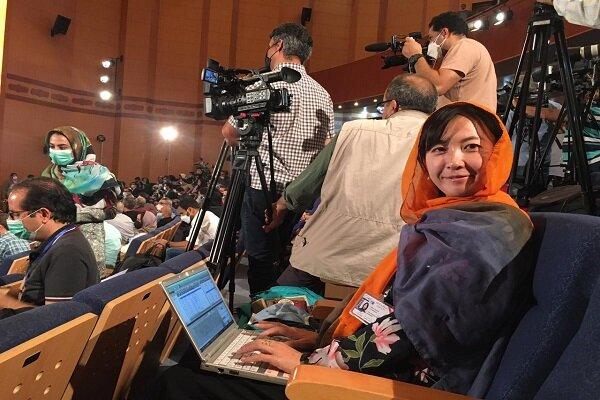Japanese reporter talks of true facts after Tehran visit
The 13th Iran Presidential Election was held on June 18 and according to the statement issued by interior minister Rahmani Fazli, Seyyed Ebrahim Raeisi won Friday's votes by a landslide, gaining 61.95% of the total votes.
During the 2021 Presidential Election, some 500 international journalists from 226 foreign media covered the event in Iran. Head of Middle East Office of Japanese Newspaper Tokyo Shimbun Miso Kumode was among the journalists who paid a visit to Tehran to cover the 13th Presidential Election. She shared her experience of visiting Iran with Mehr News Agency.
Referring to her mindset about women's status in Iran created by western Media outlets, Miso Kumode said, "Before visiting Iran, I thought that all women have to wear 'Chador' and if I take photos in the street, someone will come to me and ask me why I took the photos and tries to investigate me. My imagination about Tehran was that it is a restricted city.
"The 13th Iran Presidential Election was held on June 18 and according to the statement issued by interior minister Rahmani Fazli, Seyyed Ebrahim Raeisi won Friday's votes by a landslide, gaining 61.95% of the total votes"This was my imagination about Tehran before visiting it," adding that she thought that Iranian women's participation in social and civic activities is insignificant.
She also noted that she enjoyed Iranian food during her visit to Tehran, adding that, "Iranian food is perfect."
Commenting on the geographical location of Tehran, Kumode said that she was attracted by the mountains around Tehran and is willing to visit Tehran once again for climbing.
Miso said that her imagination of Iran before visiting was mostly created by some media including Reuters and AP, as well as some experts' opinions about Iran. "When I asked them about Iran and their people, they always told me about 'Hardliners' and never said anything about 'Principalists'. When I came here [Tehran] to cover the news of the Iran election, for the first time, I heard the word 'Principalist'.
I always heard about 'Hardliners' in the Western media."
"When I came to Iran, I interviewed with a 'Principalist' and found that a 'Hardliner' is not equal with a 'Principalist'," she added.
She went on to say that her mentality is changed after visiting Tehran and has a very good impression about Iranians, adding, "I loved it very much. It is a quiet clean city. You don't see garbage and trash on the streets. Iranian people were very nice and polite to me. I found the Iranians educated people."
Kumode highlighted that her imagination changed about Iran as a journalist as well, saying, "When I wrote articles, I always used the words like 'Hardliner' inside my articles.
"Head of Middle East Office of Japanese Newspaper Tokyo Shimbun Miso Kumode was among the journalists who paid a visit to Tehran to cover the 13th Presidential Election"Now, I changed my expression. 'Hardliner' and 'Principalist' are different. I changed my mind. I always thought that only 'Moderate Conservatives' and 'Reformists' are trying to have a good relationship with the international community."
She also pointed to the little impact of the sanctions on Iran, saying that when she visited the Grand Bazaar of Tehran, she found normal life goes on though people made complaints about rising prices under sanctions.
Referring to her visit to a ventilator manufacturing factory in Tehran, Kumode said, "Before I came here, I thought that there are some exceptions about sanctions on Iran, especially for medical section, like medicine, ventilator and some needed products for fighting against coronavirus, including masks."
"The manager of the factory told me that on the paper, there are some exceptions about sanctions on Iran, but in fact, everything is restricted," she added, saying that Iranians are making even a small piece of ventilator themselves.
The Japanese journalist also pointed to her interview with Iran's deputy health minister, saying that she understood that Iranians faced some difficulties when they tried to make COVID-19 vaccines because of the sanctions they could not import small animals testing.
She noted that they think that they are imposing sanctions on the Iranian government but the biggest victims are civilians. The normal people will face damage from the sanctions rather than politicians, stressing that sanctions are not fair especially in this pandemic situation.
Interview by Zahra Mirzafarjouyan
Related news
Other news on this day
Copyright © 2001-2024 - Sarkhat.com - About Sarkhat - News Archive - جدول لیگ برتر ایران






